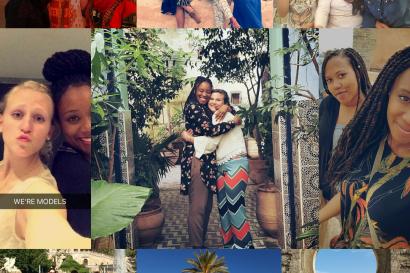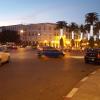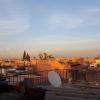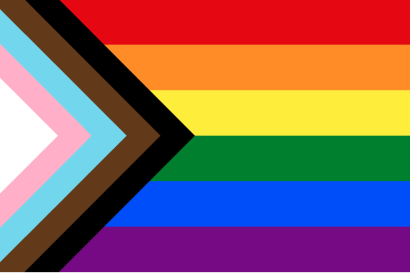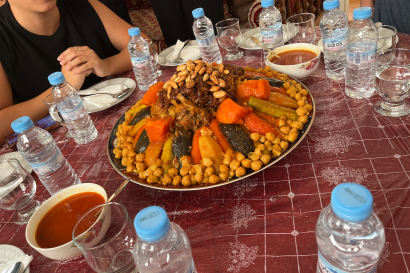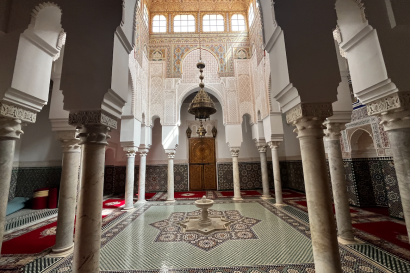I remember during my second week in Morocco, I sat in a Meknes Café among a group of my American peers and young Moroccans. I was explaining to a new Moroccan friend (in English) about the hardships I had already encountered as a foreigner trying to speak Modern Standard Arabic with other Moroccans. Intending to offer some consolation, he shrugged his shoulders, and replied nonchalantly, “Well, if they cannot understand you, you can always answer in French. They should understand that.”
I replied for the tenth time since I had been there, somewhat embarrassed, “I don’t speak French.” His face fell slightly, somewhere between surprise and disappointment. This was a strange, possibly even unheard of, concept for him to grapple with. Probably musing more to himself than to me, he said “Oh. Hmmm. In Morocco, if you don’t know French, you are basically illiterate.”
Illiterate. That was a strange, possible even unheard of, concept for me to grapple with. I am 20 years old today, I haven’t been illiterate for 16 years. My whole world, has been prescribed in English, even while I was abroad, in places as culturally insular as Oman. There is always that certain expectation that others learn English, that sites have translations, that movies have subtitles, so the native English speaker, me, can understand.
Like all those who hold privilege, I didn’t realize that I had it, until I no longer did. Here, French, not English, is still the language of the higher institutions, of medicine, of government dealings, of foreign films, of place names . . . Complexity #1.
Complexity #2 . . .
It’s not the worst thing in the world to not speak in English. Bubbles are meant to be burst. If I want to grow in character, I have to dive into the pluralities present in the world and come out appreciating something other than my own. That’s why I came to Morocco.
I came to study and speak in Arabic, the official language of Morocco, which I have been studying for two years. However, it is hard to do so when Moroccans rarely speak Arabic (any form: MSA or Darija) to me. 90% of the time Moroccans (other than my host family) speak French to me, which I don’t speak. They speak Darija to each other, and MSA on television.
Honestly, it is very frustrating—not because I find myself so self-important as to declare that a country should pick one language and stick to it. My frustrations stem from the realization that language use in Morocco comes with a power landscape that is hard to navigate, considering how communication is framed by several intersectional identities. In terms of myself: I am a young, black, American, female student.
Observing the identity that is most apparent upon sight (black), others will speak French to me, because they assume I come from a Francophone Sub-Saharan country. That assumption falls flat, when I open my mouth to say “La ataklm bil fransiyya” (I don’t speak French) in heavily American accented Arabic. It is the language that I have been studying for two years and the only language that I know besides English . . . and I don’t even know how to say I don’t speak French in French.
However, once they learn that I am American, the conversation will switch to stilted English on their part, and I am thinking, “We can just speak in Arabic. I know Arabic, and I know you know Arabic. Why is this happening?”
Power. The Residues of Colonialism. Elitism. Racial assumptions. Take your pick, they are all right to an extent…
Complexity #3
It was explained to us by an American, who has been living in Morocco for twenty years, that Moroccans speak French to non-Moroccans to prove that they are literate and educated. As a foreigner, speaking Arabic to them is almost an offense because it is viewed as an assumption that the Moroccan is not educated enough to speak French. So, even as I continue to speak Arabic to prove myself, they will continue to speak French in order to prove themselves, and somehow, I end up feeling confused and dumb.
Sometimes at restaurants, I just ask my friends to order for me or answer for me because waiters will explain things to me in French after I have said something in Arabic, and all I can do is look at them blankly.
One day, I felt particularly helpless on the tram. A frazzled French woman got on the tram, thoroughly lost and anxious. Her nervous, flitting eyes fell upon me and somehow recognized how I didn’t fit among the others: I was a foreigner. In harried, bumbling French, she asked me if this was the tram to Agdale (I think). I had to use hand motions to say yes. When we stopped at the station before Agdale, she asked again if this was Agdale. I shook my head “No,” and gestured to my ears to indicate “Listen for Agdale”. She interpreted this as her being on the wrong tram entirely, began to speak in French again, now with more fervor. My hands just fell at my sides, at a loss. She scurried away into the throng still speaking French. I hope she made it to Agdale.
In hindsight it is funny, but at the moment I felt really helpless. She turned to me because I was a foreigner like her, surely I could understand and help her. Yet, she would have been better off asking a Moroccan because in this context I am illiterate in the language of power.
My family, my friends, friends of my host family, have all said that I should learn French. Just give in. Give in? How can I? Isn’t that just colonialism all over again, why should I speak the language of oppression? I want to speak the language of the people, Arabic.
Well for some, French is not the language of oppression; and Modern Standard Arabic is just as foreign to Morocco. Arabic may be the language of religion, but its new spread into education, government, and media is part of the 20th century Arabization movement affecting the Arab World as a whole. Complexity #4.
The actual language of the Moroccan people is Darija: a mix of Arabic and Tamazight (the language of the Amazigh people), but it has its own grammar rules and vocabulary that vary distinctly from Arabic. Complexity #5.
Yet, Tamazight on its own (known more commonly as Berber) is a language largely absent from the public space in Morocco—though it is the historical language of the original people. It is a cultural remnant worth preserving; and yet, if you actually speak it, then it becomes a political statement. Complexity #6.
Moroccans who don’t speak Tamazight, speak Darija to one another because it is the mother tongue. My Internship Supervisor/ Professor, has called Darija the mother tongue of Morocco, which is true. However, when I first heard that, I was surprised. So many times I have heard a Darija conversation evolve into French or a French conversation devolve into Darija. The languages seem to flow in and out of each other in a Moroccan’s head. Yet, I used the words devolve and evolve purposefully, because in the Moroccan culture that hierarchy of language is present, and it is accepted. I often wonder how French can be apart from and yet a part of Moroccan culture simultaneously, and if French will always be the language of access within Morocco… Complexity #7
Maybe not. The infiltration of English in media and economics is affecting the younger generations. My host sister and her friends take English classes. The friends we made in Meknes spoke in English. My host sister says she wants to be a flight attendant, and to do that “. . . you have to speak English really well. You have to speak English to get anywhere.” English is the language of international access.
So, wait. . . Maybe I still have language privilege? Complexity #8
Why am I going on and on about how hard it is to communicate in a foreign country? Jada, this is expected. I know, I know. But, my initial frustrations have become curiosity. The way communication manifests in Morocco is representative of how the culture deals with its past traditions and history, its present international relations, and future economic aspirations. Language is always in flux here, and until I can get a grip as to how I locate myself within this space, I am in flux too.
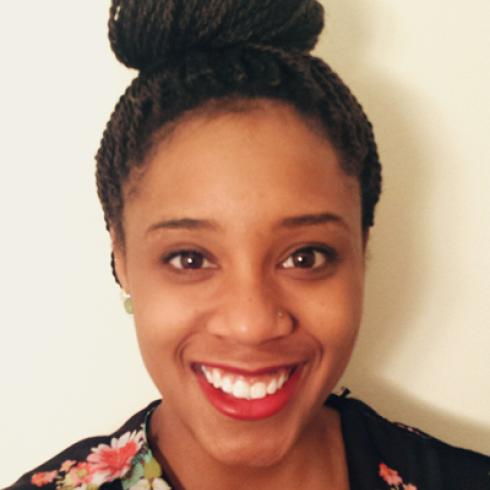
Jada Bullen
<p>I am Junior studying in the School of Foreign Service at Georgetown University. As a feminist by thought and a hipster at heart, I seek every opportunity to break the barriers, disprove the labels, and blur the lines.</p>
